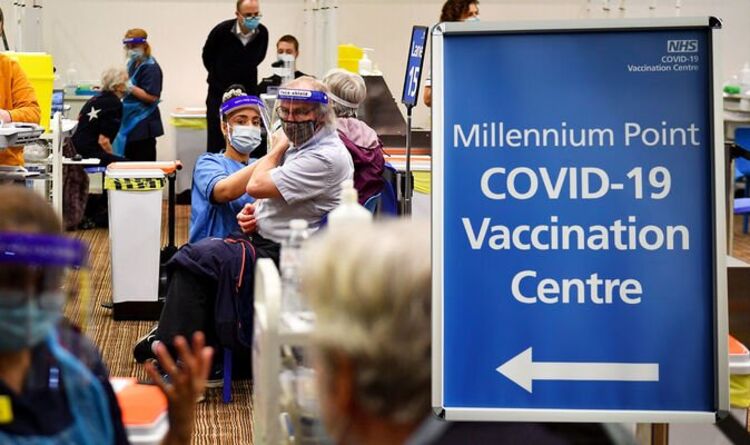Coronavirus isolation rule changes criticised by Dr Nagpaul
We use your sign-up to provide content in ways you’ve consented to and to improve our understanding of you. This may include adverts from us and 3rd parties based on our understanding. You can unsubscribe at any time. More info
Covid booster jabs in late 2021 helped to reforge immunity against the Omicron variant, an offshoot of the base strain capable of bypassing the previous two doses. Now satisfied the booster programme was a success, the Government is reopening society, allowing people who have tested positive to walk free without self-isolating. With the last few rules gone by the end of February, the JCVI has green-lit a new stage for the booster programme to take effect within the next few months.
Who can get vaccinated this spring?
As the Government allows Covid infections to work their way through the population, an additional jab will help protect the most vulnerable.
Those who received their third vaccinations in September or October 2021 can take a fourth to extend their waning immunity.
Following the pattern established by the other jab regimens, it will cover the most vulnerable Britons first.


The JCVI advice states that vaccine immunity “declines over time”, and some people will need another as they approach the six-month mark since their last.
At present, this includes older populations and those with chronic illnesses.
Adults aged 75 and over may receive the spring dose, including those residing in a care home.
Children aged 12 and over who are “immunosuppressed” can also sign up for the jab.

The type of vaccine these groups can receive will differ.
The JCVI has earmarked the Moderna and Pfizer vaccines for older Britons aged 18 and over.
The younger recipients will only have the Pfizer version available to them.
The organisation has also indicated it may advise highly vulnerable people to receive another jab further down the line.

The JCVI provided “additional interim advice to ministers” suggesting another booster in autumn 2022 would benefit those “at higher risk of severe COVID-19”.
Since 2020, research has shown that Covid tends to surge in the winter months, meaning an autumn regimen would provide early protection.
But the JCVI added it is “too early” to set out the details of this programme at present.
Sajid Javid, the health secretary, said the UK’s four home nations would follow the advice outlined by the organisation.
He said: “Following the JCVI’s advice, I have asked the NHS to prepare to offer those eligible a vaccine from around six months after their last dose and they will set out further details in due course.
“We know immunity to COVID-19 begins to wane over time. That’s why we’re offering a spring booster to those people at higher risk of serious COVID-19 to make sure they maintain a high level of protection.
“It’s important that everyone gets their top-up jabs as soon as they’re eligible.
“The JCVI will keep under review whether the booster programme should be extended to further at-risk groups.”
Source: Read Full Article
